|
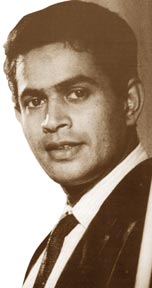 Tony
Ranasinghe: Tony
Ranasinghe:
The Bard’s thespian
by Pramod de Silva
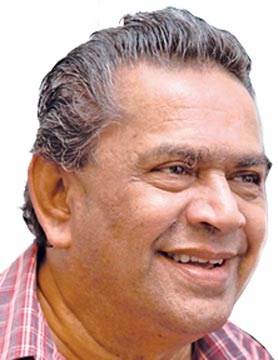 Shakespeare in Sinhala? The Bard’s dramas are complex enough even in
the original language and it is certainly no easy task to translate them
into any other language. Yet this is a feat that Tony Ranasinghe
excelled in with remarkable success. Ranasinghe Hettiarachchilage
Ignatius Anthony Silva, popularly known as Tony Ranasinghe, was better
known as a veteran thespian who made the silver screen (and later the
small screen) come alive with his riveting performances. But not many
people knew that he had an intimate affinity towards Shakespearean drama
as well. Shakespeare in Sinhala? The Bard’s dramas are complex enough even in
the original language and it is certainly no easy task to translate them
into any other language. Yet this is a feat that Tony Ranasinghe
excelled in with remarkable success. Ranasinghe Hettiarachchilage
Ignatius Anthony Silva, popularly known as Tony Ranasinghe, was better
known as a veteran thespian who made the silver screen (and later the
small screen) come alive with his riveting performances. But not many
people knew that he had an intimate affinity towards Shakespearean drama
as well.
It
was a passion that kept him enthralled right up to his last breath last
week, at the age of 77. Tony got his first taste of Shakespeare at the
tender age of 11, in 1948, the very year Sri Lanka gained Independence.
As the celebrated British actor Sir Laurence Olivier strode on to the
movie screen as Hamlet, little Tony was transfixed. His young mind
instantly knew what he wanted to do – become an actor and play
Shakespeare. But little did he know that he would one day become the man
who would take the words of the Bard – in Sinhala – to a whole new
audience of readers.
He was working on ‘Midsummer Night’s Dream’, ‘Hamlet’ and ‘Much Ado
About Nothing’ when he was called to Rest. Over the last few years, he
has released the Sinhala translations of Twelfth Night, Julius Caesar
and Othello which were eagerly received by readers who have come to love
Shakespeare. He dismissed the idea that Shakespeare was alien to local
readers and theatre goers – as far as back as 1884 veteran dramatist C.
Don Bastian had translated Romeo and Juliet into Sinhala and staged it.
Craving for Shakespeare
“I have a craving for Shakespeare,” he once told an interviewer.
Indeed, he could recite many of the verses from memory. And his craving
has made the local literary scene richer and it is hoped the books he
was working on will be published soon.
|
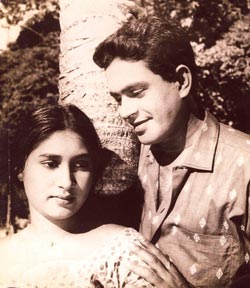
Wasanthi |
|
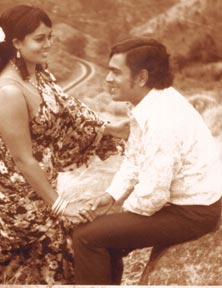
Sakunthala |
 Tony did not translate for the sake of translating – he had an innate
desire to inform the reader and enrich the mind – for example in Julius
Caesar, he traces the background, gives an overview of Rome and its
history. He brilliantly analyses the play in the context of historical
developments before coming to the play per se. He also presents a
lengthy discussion on Shakespeare’s life and his contribution to
literature. Entertaining, yes, but even more informative. Tony did not translate for the sake of translating – he had an innate
desire to inform the reader and enrich the mind – for example in Julius
Caesar, he traces the background, gives an overview of Rome and its
history. He brilliantly analyses the play in the context of historical
developments before coming to the play per se. He also presents a
lengthy discussion on Shakespeare’s life and his contribution to
literature. Entertaining, yes, but even more informative.
Two incidents conspired to give Tony the chance to immerse himself
fully in Shakespeare. After an attack of cellulitis in 2007 he had to
undergo a calf operation. A stomach ulcer in 2011 also called for
surgery. Doctors recommended he should not undertake any strenuous
activity, and acting was one. Having taken a clean break from celluloid,
he had ample time to concentrate on translating and writing. Today, we
know of Tony mainly as an actor – and indeed it was Shakespeare’s medium
– the stage – that made him one. An old boy of St. Anthony’s College
Wattala and De LaSalle College, Modera, Ranasinghe was inspired by Tower
Hall dramatists W. Livinus Perera and S.D. Steven Silva who were also
from Modera, where Tony was born. Hailing from a devout Catholic family,
he was also inspired by some of the Christian plays staged at his local
church.
Deep desire for acting
Having seen these performances on stage, Tony had a deep desire to
get into acting as a career. This chance came in 1963 with the stage
play ‘Ran Thodu’. And he won the Governor General’s Award for Best Stage
Actor for his role. From then on, the ‘Ape Kattiya’ theatre group cast
him in practically all of their stage plays. It was an auspicious start
to a scintillating film, drama and teledrama career.
Tony once recalled having met the legendary Sirisena Wimalaweera
(owner of the Nawa Jeevana Studio in Kelaniya) to get a starring role in
a film. He was accompanied on this mission by Arthur Amarasena, Sriyani
Amarasena’s husband. Having asked a few questions, Wimalaweera offered
to give Tony a chance in a film titled ‘Punchi Amma’, which never saw
the light of day. But this dashing young man with a deep voice
eventually caught the attention of another legend - Lester James Peries’
– who cast him in ‘Gamperaliya’ (1964).
Accompanied by Sumitra and Gamini Fonseka, Lester had been impressed
with his stage performance in Sugathapala de Silva’s drama ‘Boarding
Karayo’ and had no hesitation in offering him a supporting role as
‘Baladasa’ even though most of the casting had already been done. This
was Tony’s first starring role. Over the years, he would work with
Lester on many more films.Tony never looked back after the success of ‘Gamperaliya’,
based on martin Wickramasinghe’s seminal work. He was awarded the Best
Supporting Actor Sarasaviya Award in 1966 for his role in ‘Parasathu
Mal’. This was a major challenge for Tony – he had to work alongside the
doyen of the Sinhala cinema Gamini Fonseka, who also directed the film.
Best
ActorSubsequently he won Best Actor Awards for ‘Hanthane Kathawa’ (1969,
incidentally the first film of another screen legend Vijaya
Kumaratunga), ‘Duhulu Malak’ (1976) and ‘Ahasin Polawata’ (1979). All
these are landmark films in Sinhala cinema. In 1980, he played a
memorable role in the critically acclaimed ‘Ganga Addara’.
He was recognized as the Best Actor for 1993’s ‘Saptha Kanya’ by
Sarasaviya, Swarna Sanka, Presidential Awards and OCIC. From 1964
onwards, he acted in nearly 120 Sinhala movies, right up to ‘Nil Diya
Yahana’ (2008). Among his movies were ‘Senasuma Kothanada’, ‘Onna Maame
Kella Penapi’, ‘Yahalu Yeheli’, ‘Getawarayo’, ‘Walmath Voowo’, ‘Unnath
Daahai Malath Daaha’, ‘Adare Hithenawa Dekkama’, ‘Veera Puran Appu’ and
‘Hulawali’. Tony was also an accomplished screenwriter – ‘Koti Waligaya’,
‘Keli Mandala’, ‘Awaragira’, ‘Duwata Mawaka Misa’ and ‘Pavuru Walalu’
were all scripted by him.
|
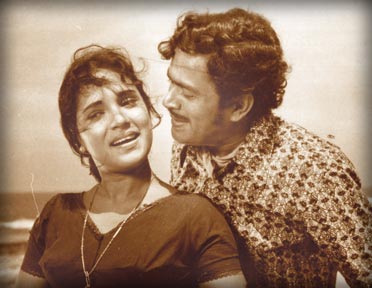
Hitha Mithura |
His grasp of the Sinhala language was exemplary and his dialogues
were spot on. His transition to the small screen was seamless – he
slipped effortlessly to teledrama roles. If not for the surgeries, he
would have continued his teledrama career. Tony was a professional actor
but like most others of his generation, he also had a ’day job’ first at
the Department of Government Electrical Undertaking (later the Ceylon
Electricity Board). Incidentally, this is where his screen name was
‘born’.
Tony had long wanted to shed the Silva part of his name, but had not
done so thinking that he would have to go through the hassle of
inserting an advertisement in the newspapers, as is usually the case.
But the Chief Clerk there offered him a splendid solution: as he was a
government servant, he only had to inform the Shroff. And thus he became
‘Tony Ranasinghe’, Tony being derived from Anthony.
Marriage and family
Later on, he married Sirima Indrani Wickremasuirya, (who had no
connection with the cinema) and was the father of four children. He also
had six grandchildren.Tony did not like to call himself perfect and was
humble enough to find out flaws in his performances on stage and on
film. Every film was a learning experience for Tony, who always yearned
to give a better performance the next time around.
He entertained us for more than five decades through a variety of
media and will live on in our hearts. Television will no doubt introduce
a new generation of viewers to acting skills and his books will continue
to bring Shakespeare to life. |

